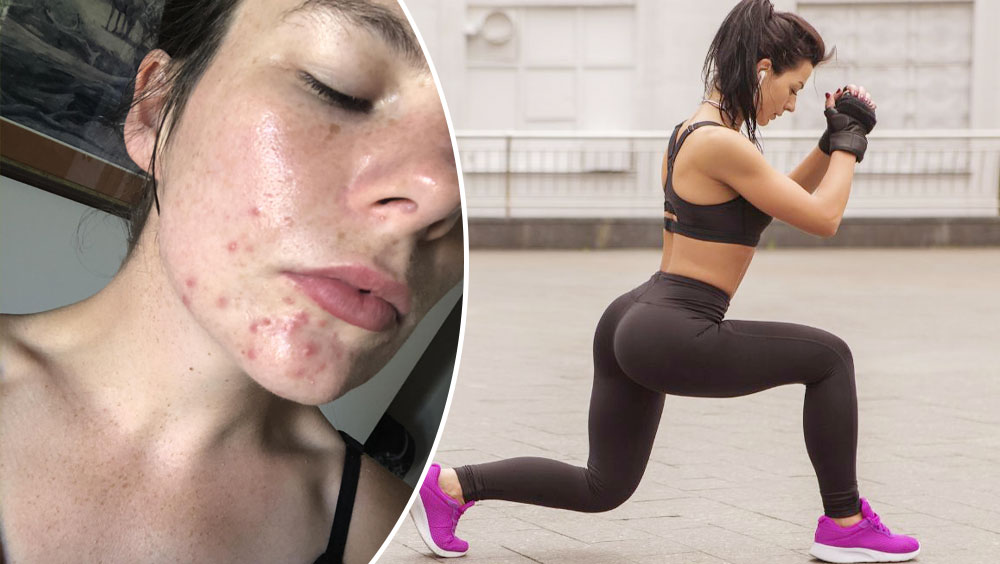Exercise is an essential part of staying healthy, both physically and mentally. But can it also help improve your skin? Many people wonder if exercise has any effect on acne, a common skin condition that affects nearly 10% of the population worldwide.
Understanding Acne and its Causes
Acne, a common skin condition affects people of all ages. From teenagers to adults, many individuals struggle with this frustrating issue. Understanding acne and its causes is key to effectively treating and managing the condition.
What Is Acne?
Acne is characterized by pimples, whiteheads, blackheads, and sometimes, cysts or nodules. It most commonly appears on the face, but can also be found on the neck, chest, back, and shoulders.
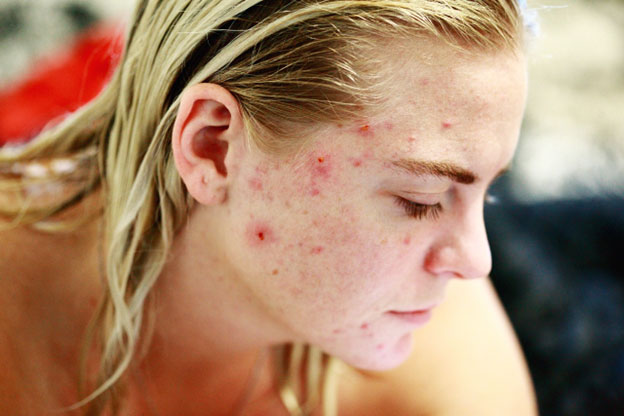
One of the primary causes of acne is the overproduction of sebum, a natural oil that keeps the skin moisturized. When the body produces excess sebum, it can mix with dead skin cells and clog the pores, leading to the formation of blackheads and whiteheads. Bacteria on the skin can then inflame these clogged pores, resulting in red, swollen pimples.
Factors Contributing to Acne
Hormonal changes, especially during puberty, can lead to increased sebum production and more frequent breakouts. Androgens, a type of hormone, stimulate the oil glands in the skin, making it more acne-prone.
Diet can also impact acne. Some studies suggest that high glycemic index foods, such as sugary and processed foods, can trigger acne breakouts. Additionally, dairy products and foods rich in omega-6 fatty acids may contribute to acne development in some individuals.
Stress is another factor that can aggravate acne. When we're stressed, our bodies release cortisol, a stress hormone, which can increase sebum production and inflammation in the skin. High levels of stress can also disrupt hormone balance, making acne symptoms worse.
Genetics also play a role in acne susceptibility. If your parents or close relatives have a history of acne, you may be more likely to develop it yourself.
The Impact of Exercise on Acne
Regular exercise not only gives us a healthy body but can also have a positive impact on our skin, specifically acne-prone skin. While exercise alone may not completely cure acne, it can contribute to improving the condition of our skin.
Exercise and Circulation
Improved blood flow brings a fresh supply of oxygen to the skin, aiding in cell renewal and rejuvenation. It also helps nourish the skin cells, providing them with the necessary nutrients they need to function optimally. Additionally, increased blood flow helps carry away waste products and toxins from the skin, preventing them from accumulating and potentially leading to acne breakouts or other skin concerns.
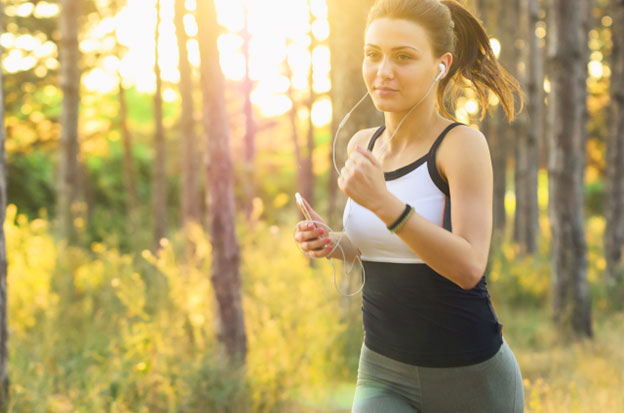
Exercise can also promote healthy skin by stimulating the production of collagen, a key protein that contributes to skin elasticity and strength. Improved blood circulation brings a fresh supply of nutrients to the skin, which is vital for collagen synthesis and maintenance. This can help improve the appearance of fine lines and wrinkles, leading to a more youthful complexion.
Sweat and Skin Cleansing
Exercise doesn't just have benefits for your overall health; it can also play a role in improving the appearance of your skin. When you work up a sweat during exercise, it can potentially help in cleansing your skin by removing dirt, debris, and acne-causing bacteria.
Sweat is made up of water and small amounts of salt and other minerals. As you perspire, sweat carries away impurities from your skin, helping to unclog pores and prevent the buildup of sweat-related breakouts. This natural detoxification process can be beneficial for individuals with acne-prone skin.
Stress Reduction and Acne
Stress can be a major trigger for acne breakouts. When we experience stress, our bodies produce higher levels of stress hormones like cortisol, which can lead to increased oil production and inflammation in the skin. This, in turn, can contribute to the development of acne.
Regular exercise has been shown to be an effective stress reducer. Physical activity releases endorphins, which are known as "feel-good" hormones that help improve mood and reduce stress levels. Engaging in moderate exercises such as walking, jogging, or yoga can help alleviate the burden of stress and promote a healthier state of mind.
By lowering stress levels, exercise can potentially improve acne-prone skin. When stress hormone levels are reduced, there may be a decrease in oil production and inflammation, leading to fewer acne breakouts. However, it's important to note that exercise alone may not fully address all aspects of acne. It is still crucial to maintain proper skincare routines and consult with a board-certified dermatologist for personalized acne treatments.
Optimizing Your Skincare Routine
When it comes to skincare, many people focus solely on finding the right products or treatments to address their skin concerns. While this is an important aspect of achieving healthy and glowing skin, it's crucial not to overlook the significance of optimizing your skincare routine.
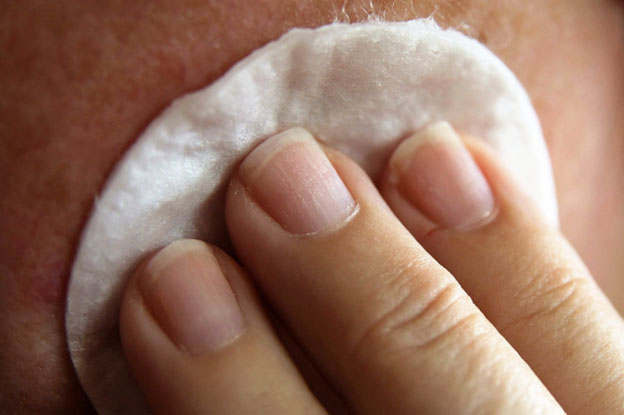
Pre-Workout Skincare
Preparing your skin before exercise is essential to keep it healthy and prevent acne breakouts. Here are a few tips to follow for a pre-workout skincare routine:
Cleansing: Before exercising, cleanse your face with a gentle, oil-free cleanser to remove dirt, oil, and impurities. This step will help prevent clogged pores that can lead to breakouts. Use lukewarm water to avoid drying out your skin.
Moisturizing: Hydrate your skin with a lightweight, oil-free moisturizer suitable for your skin type. This step ensures that your skin stays balanced and hydrated during your workout.
Non-comedogenic products: Avoid using heavy makeup or skincare products that may clog your pores during exercise. Instead, opt for non-comedogenic or oil-free products that won't interfere with your skin's ability to sweat and breathe.
Clean hair: If you have long hair, tie it back to keep it away from your face and prevent hair products from contacting your skin. Hair products can contribute to clogged pores and acne breakouts.
Post-Workout Skincare
After a vigorous workout, it's important to give your skin some post-workout TLC to keep it healthy and blemish-free. Here are some essential post-workout skincare practices to follow:
Cleanse gently: Sweat, dirt, and oil can accumulate on your skin during a workout, leading to clogged pores and acne breakouts. Use a gentle cleanser to remove these impurities, but avoid scrubbing or over-cleansing, as it can irritate the skin. Opt for a cleanser that is suitable for your skin type and use lukewarm water to avoid drying out your skin.
Moisturize effectively: Exercise can cause your skin to lose moisture, so it's essential to replenish it with a lightweight, oil-free moisturizer. Choose a moisturizer that suits your skin type to ensure that your skin stays balanced and hydrated throughout the day.
Avoid heavy products: While it may be tempting to cover up any post-workout redness or blemishes with heavy makeup, it's best to avoid it. Heavy products can clog your pores and worsen acne breakouts. Opt for non-comedogenic or oil-free products that won't interfere with your skin's ability to sweat and breathe.
Conclusion
Overall, exercise can help improve acne due to factors like blood circulation, reduced stress, and increased oxygen levels in the skin. Just remember to follow a proper skincare routine before and after exercise to get optimum skin benefits from exercise.
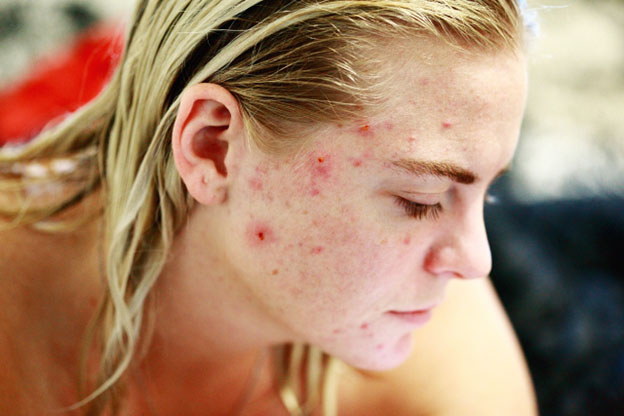
Frequently Asked Questions:
Can exercise worsen acne?
Exercise typically does not worsen acne but can actually help improve it. Regular exercise promotes healthy blood flow and circulation, which can aid in the removal of dead skin cells and toxins from the body. However, if proper skincare measures are not taken, sweat and bacteria can accumulate on the skin and potentially clog pores, leading to acne breakouts.
How often should I exercise to potentially see improvements in my acne?
Consistency is key when it comes to seeing improvements in acne with exercise. Aim for activities like brisk walking, jogging, swimming, or cycling. Remember to always listen to your body and stop if any discomfort or pain arises.
Are there specific exercises or activities that are more beneficial for acne-prone skin?
There are no specific exercises or activities that are known to be more beneficial solely for acne-prone skin. The key is to engage in regular physical activity that increases blood flow and promotes overall health. However, certain activities like yoga can help reduce stress levels, which can indirectly improve acne.
Can wearing tight-fitting workout clothing contribute to acne?
Wearing tight-fitting workout clothing can contribute to acne by causing friction and trapping sweat against the skin. This can lead to irritation and clogged pores. It is important to choose breathable and moisture-wicking fabrics when exercising. Additionally, make sure to shower and change out of sweaty clothes as soon as possible after a workout.
Should I avoid wearing makeup while exercising?
It is generally advisable to avoid wearing heavy makeup while exercising, as it can clog pores and contribute to acne breakouts. If you prefer to wear makeup, opt for lightweight, non-comedogenic products that will not clog pores. Be sure to cleanse your skin thoroughly before and after exercising to remove any makeup and sweat from the skin.

